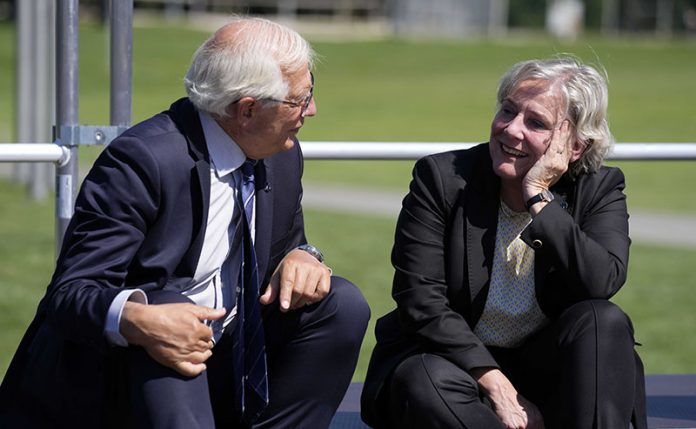
By SAMUEL PETREQUIN
Associated Press
BRDO CASTLE, Slovenia (AP) — Still reeling from the European Union’s shortcomings in Afghanistan, officials from the 27-nation bloc on Thursday discussed ways to improve their response to future crises and not be so reliant on the U.S.
“Afghanistan has shown that the deficiency in our strategic autonomy comes with a price,” EU top diplomat Josep Borrell said following talks with defense ministers that also involved NATO and UN officials. “And that the only way forward is to combine our forces and to strengthen not only our capacity, but also our will to act.”
European ministers of defense and foreign affairs gathered in Slovenia to look at ways to improve the bloc’s operational engagement and develop a rapid response force capable of operating in difficult military theaters.
They also discussed plans for the so-called strategic compass, a document aiming at harmonizing crisis management and defining defense ambitions for the bloc that is expected to be drafted before the end of the year.
One EU official with direct knowledge of the ministerial discussions said there was a general consensus to acknowledge the “fiasco” that followed the withdrawal of Western troops from Afghanistan.
The Taliban’s takeover of Afghanistan and the rushed airlift operation that followed the U.S. decision to pull out from the country have laid bare the EU’s dependency on its ally. Without American support, European countries wouldn’t have been able to guarantee the safe passage of their citizens or even their troops out of the war-torn country.
“The strategic situation, the geostrategic changes, show that now we need a stronger Europe,” said Claudio Graziano, the chairman of the EU military committee. “The situation in Afghanistan, Libya, Middle East, Sahel, show that now it’s the time to act starting with the creation of a rapid European entry force able to show the will of the European Union to act as a global strategic partner. When if not now, later would be late.”
But finding a consensus among the 27 EU member states to create such a standby EU force of around 5,000 troops is not an easy task.
European countries on the border with Russia often oppose the idea of autonomy, for instance Poland and the Baltic nations. EU heavyweight Germany is also a strong supporter of using NATO for security operations and keeping the U.S. defense umbrella in Europe.
“We don’t have yet a complete unanimity, I would be lying to you if today everybody agreed on that explicitly,” Borrell said.
Borrell said that in light of the disengagement of the U.S. on the international scene, the EU has no other option than to increase its capacity to act independently.
“It’s nothing against NATO, it’s nothing against the EU-US alliance, it’s a way of becoming stronger, facing our responsibilities and mobilizing the resources in order to face the challenges that we will have to face,” he said.
The EU is already endowed with rapid reaction teams — so-called battlegroups — each made up of about 1,500 personnel. But they have never been used in major crises, and the bloc doesn’t deploy EU missions to active conflict zones.
German defense minister Annegret Kramp-Karrenbauer said the focus now would need to be on the kinds of troops needed to conduct a mission such as the U.S. military-run evacuation from Kabul airport.
“It’s not about what NATO does or what the EU does,” she added. “To some extent it’s about what we as Europeans do in NATO.”
Slovenian Defense Minister Matej Tonin, whose country currently holds the EU’s rotating presidency, said defense ministers also debated how to send soldiers abroad even without consensus, by lifting the unanimity requirement.
“Maybe the solution is we invent a mechanism where a classical majority will be enough and those who are willing will be able to go,” he said. “If a majority within the European Union decides to send somewhere the troops, they can go in the name of the European Union. And the countries which will participate in these groups will be let’s say the willing countries. So that we don’t force the countries who don’t want be part of that mission.”
The situation in Sahel has drawn comparisons with the U.S departure from Afghanistan since the French are preparing to reduce their military presence in the West Africa region where extremist groups are fighting for control.
In June, French President Emmanuel Macron announced the end of Operation Barkhane, France’s seven-year effort fighting extremists linked to al-Qaida and the Islamic State group in Africa’s Sahel region. France’s more than 5,000 troops will be reduced in the coming months, although no timeframe has been given. Some observers have expressed worries a scaling down of the foreign forces could lead to more instability in the region.
“We learned very important lessons and that we should not repeat the same mistakes in the Sahel,” Tonin said. “It’s even more important for the European Union than Afghanistan. It can have greater consequences.”















